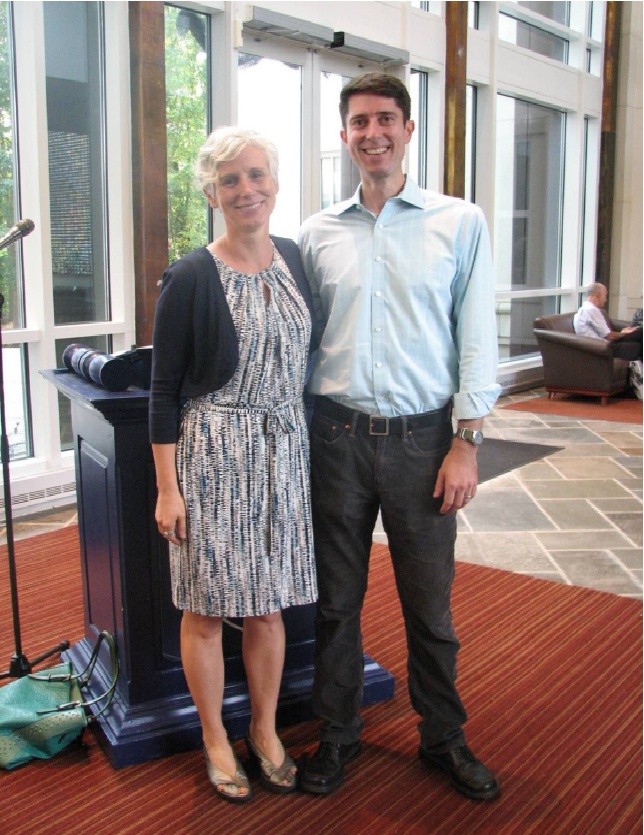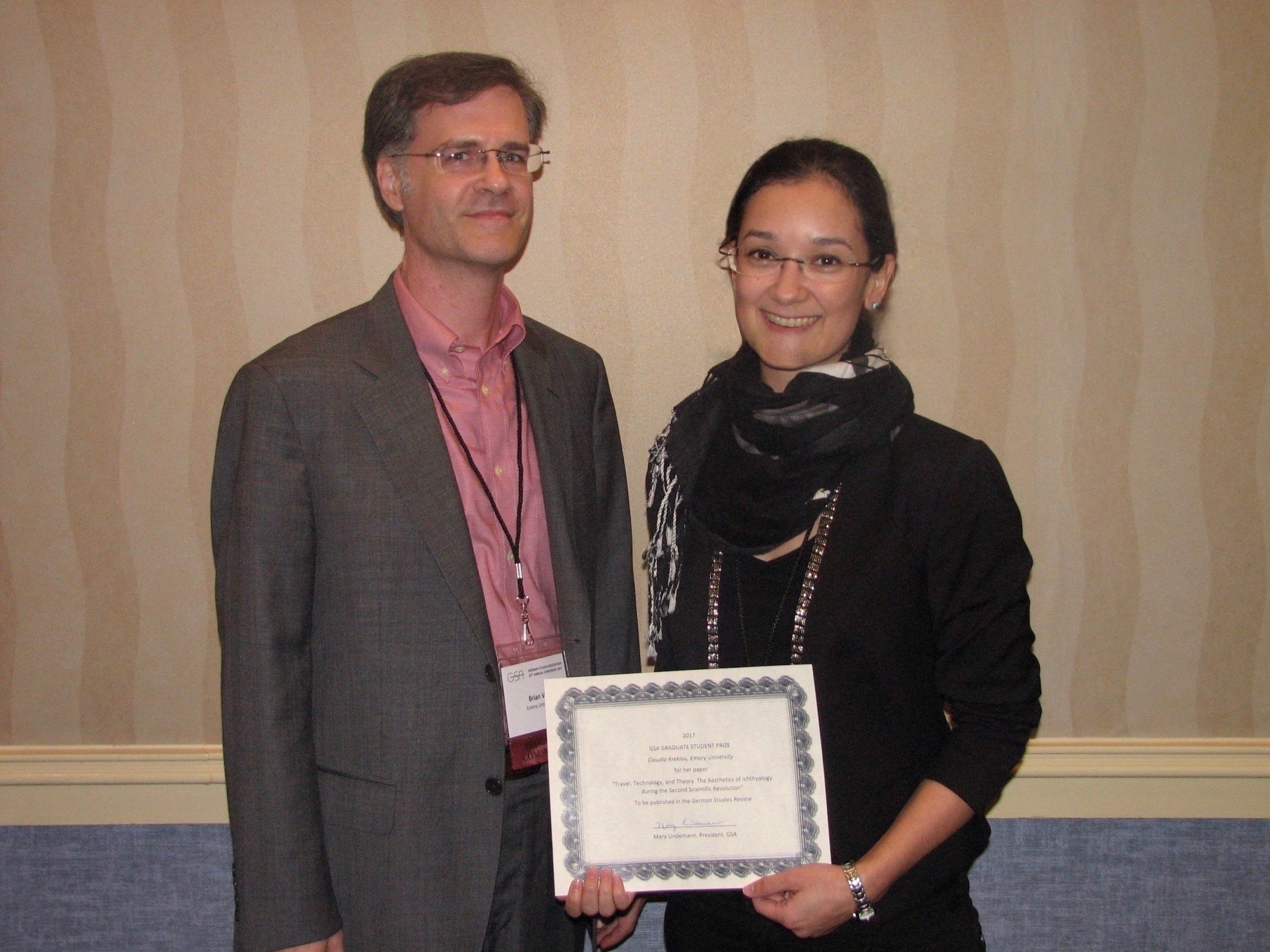Congratulations to Dr. Tehila Sasson, Assistant Professor of History, for winning a National Endowment for the Humanities Fellowship. The NEH will support Sasson’s work on a book-length study on the development of humanitarianism from the 1940s to the 1980s, entitled Humanitarian Ethics, Global Markets, and Everyday Life. View all NEH grantees here.
Category / Research
Yannakakis and Rogers Honored with Named Chair Professorships

Congratulations to Dr. Yanna Yannakakis and Dr. Thomas D. Rogers for receiving named chair professorships. Associate Professor of History and a specialist in colonial Mexico, Yannakakis received the Winship Distinguished Research Professorship in History for the 2018-2021 term. Rogers is Associate Professor of Modern Latin American History and will serve as the NEH/Arthur Blank Distinguished Teaching Professor for the same period. Read more about these named chairs below, and view others available to Emory Faculty here.
The Winship Distinguished Research Award is given to tenured faculty who demonstrate singular accomplishments in research. Such recognition should honor achievement and further scholarly research and research-based teaching. Awarded for a three-year term.
The Arthur Blank/NEH Chair in the Humanities and Humanistic Social Sciences is given to tenured faculty in the humanities and/or humanistic social sciences with a record of exemplary teaching and a commitment to pedagogical rigor and innovation. Appointees are expected to organize programming designed to enhance pedagogy and curricular development in the College, and continue teaching in her/his department(s), including at least one introductory level course each year. One leadership function of the NEH professors will be to serve on a newly formed advisory committee on Pedagogy and Curriculum. Awarded for a three-year term.
Innovative Teaching and Learning in Crespino’s “History 385: Right-Wing America” Culminates in “Documenting the Right” Student Film Festival
Students in Dr. Joseph Crespino‘s fall 2017 class, “History 385: Right-Wing America,” produced short documentary films that were screened on November 29 at the “Documenting the Right” Student Film Festival. Students took advantage of Emory’s rich library holdings in crafting videos whose themes ranged from racism in the career of George Wallace to Atlanta’s motto as the “city too busy to hate.” Read more about the project on the Emory Center for Digital Scholarship Blog: “Emory history class uses digital storytelling to study political movements.”
Daniel LaChance Makes Appearance on Al Jazeera
Assistant Professor of History Daniel LaChance recently made a television appearance on Al Jazeera. He discussed President Trump’s tweets calling for the “death penalty for the NY terrorist attacker.” LaChance is a specialist in the history of capital punishment and author of Executing Freedom: The Cultural Life of Capital Punishment in the United States (University of Chicago Press, 2016).

Mark Ravina Publishes ‘To Stand with the Nations of the World: Japan’s Meiji Restoration in World History’
Mark Ravina, Professor and a specialist in Japanese history, has published a new book with Oxford University Press: To Stand with the Nations of the World: Japan’s Meiji Restoration in World History. Released in advance of the 150th anniversary of the 1868 Meji Restoration, Ravina’s new work is also the first one-volume study of the event in 45 years. Daniel Botsman of Yale University described it as “essential reading for anyone seeking a fuller understanding of Japan’s place in the modern world. Tracing the confluence of global and local forces of change, as well as the impact of lessons remembered from the deeper past, it offers an impressively broad-ranging account of this most consequential of historical moments.”
Illustrated Excerpt of Peterson’s ‘Indians in the Family’ in ‘Southern Spaces’
Dawn Peterson, Assistant Professor of History, published an illustrated excerpt of the introduction to her newest book in Southern Spaces. The book is titled Indians in the Family: Adoption and the Politics of Antebellum Expansion and published by Harvard University Press this year. As explained on the Southern Spaces page, the book “looks at a group of white slaveholders who adopted Southeast Indian boys (Choctaw, Creek, and Chickasaw) into their plantation households in the decades following the US Revolution. While these adoptions might seem novel at first glance, they in fact reveal how the plantation household—and the racialized kinship structures that underpin it—increasingly came to shape human life for American Indians, African Americans, and Euro-Americans after the emergence of the United States.” Check out the piece on Southern Spaces, which includes a fascinating series of images that range from a Catawba deerskin map (1724) to a photo of Pupils at Carlisle Indian Industrial School (circa 1900).
Claudia Kreklau (PhD Candidate) Wins Essay Prize from German Studies Association

Claudia Kreklau and her faculty advisor Dr. Brian Vick.
Big news! Congratulations to Claudia Kreklau for winning the 2017 Graduate Student Essay Prize of the German Studies Association for her paper “Travel, Technology, and Theory: The Aesthetics of Ichthyology during the Second Scientific Revolution.” The prize jury thought that the essay “stood out for its clear organization, its accessible, lucid writing, and its deep level of research.” As part of the Prize, the essay will be published in the German Studies Review. As the laudatio indicates, “whether one comes from the angle of the historian, or literary scholar, or naturalist, this essay offers innovative and persuasive perspectives on the intersection of the natural world with technology and human intervention.” Congratulations, Claudia, on this major achievement!
Roxani Margariti, MESAS Associate Professor and Associated Faculty in the History Department, Wins Greek Diaspora Fellowship
Congratulations to Roxani Margariti, Associate Professor in Middle Eastern Studies and Associated Faculty in the History Department, for winning a Greek Diaspora Fellowship. Margariti will teach a graduate seminar at the University of Crete, titled “From Muhammad to the Mamluks: Medieval Middle Eastern and Islamic History and Historiography.” Read the Emory News Center’s story about Margariti’s course, and learn more about the Greek Diaspora Fellowship Program.
Dr. Ernest Freeberg (Ph.D., 1995) to Present at National Archives at Atlanta
Ph.D. alumnus Ernest Freeberg (1995) will return to Atlanta on September 16 to present at a symposium, The Great War Over Here: Stories from the Home Front, held at the National Archives at Atlanta. Freeberg is Department Head and Professor at the University of Tennessee, Knoxville and the author of Democracy’s Prisoner: Eugene V. Debs, the Great War, and the Right to Dissent (Harvard UP, 2010). View more details about the event here.
Dr. Kristin Mann Wins Distinguished Scholar Award

Congratulations to Dr. Kristin Mann, Professor of History, for winning the Distinguished Scholar Award from the Lagos Studies Association. Mann’s book publications about Lagos include Marrying Well: Marriage, Status and Social Change among the Educated Elite in Colonial Lagos (Cambridge UP, 1985) and Slavery and the Birth of an African History: Lagos, 1760-1900 (Indiana UP, 2007). Read a more complete description of Mann’s scholarship and service to the discipline, written by Dr. Jessica Reuther (Ph.D., 2016), here.
